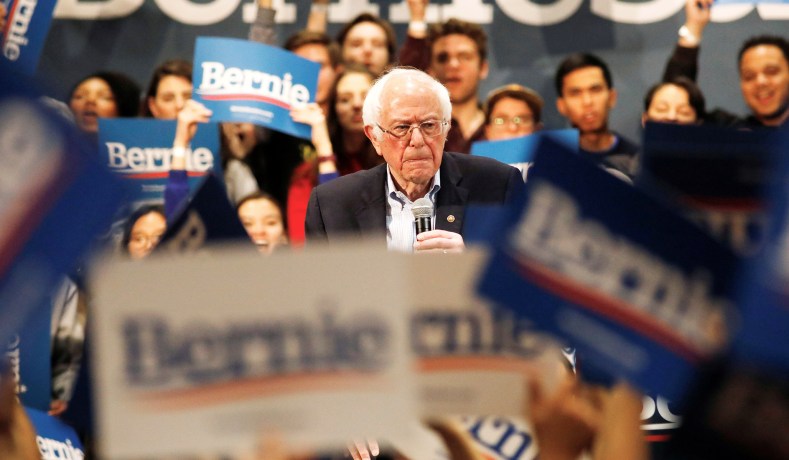
Four frequently overlooked weaknesses of Bernie Sanders:
Another health issue, even a minor one, would end his campaign. Trying to knock off a candidate who has the largest plurality of delegates in a convention floor fight is an extremely difficult task … unless that candidate is 78 years old and has had two significant health incidents in a year. Sanders needs to stay visibly and indisputably healthy until the Democratic convention in mid-July. If Sanders suffers anything worse than a bad cold, he’ll give the superdelegates the excuse they need: “Of course we all love Bernie, but we just can’t risk nominating someone who could suffer another heart attack at any moment.”
He won’t, or can’t, vary his emotional tone. Bernie Sanders is a remarkably consistent debater, which brings advantages and disadvantages. Everybody knows who he is, what he stands for, and what he would try to do if elected. But Sanders pretty much has one setting: shouting that he’s not going to pay a lot for this muffler. He doesn’t do the tearful and empathetic tales of ordinary Americans he’s met on the campaign trail, he doesn’t tell stories from tougher times earlier in his life, he doesn’t crack a lot of jokes. We hear little about Jane Sanders or his son Levi. He doesn’t seem interested in the soft-focus or humanizing stuff. Maybe that isn’t as needed as it used to be now that we’re in the Trump era. But the contrast with, say, Barack Obama or Bill Clinton is striking.
He’s got one big theme and isn’t that interested in what doesn’t fit that theme. James Pethokoukis contends, “Literally every Bernie explanation for every problem is corporate greed. Makes it easy to do economic policy because you don’t have to know anything about economic policy. Or costs and benefits. Or trade-offs. Or unintended consequences.” When Sanders is taken far afield of U.S. economic inequality, his answers either start to get nonsensical or he steers back to the same themes in different contexts.
He sees the Sunni-Shia divide as akin to bickering neighbors. “We’ve got to bring Iran and Saudi Arabia together in a room, under American leadership, and say, ‘we are sick and tired of us spending huge amounts of money and human resources because of your conflicts.’” He contends that we’ve been fighting a war on terror through three administrations to distract the public: “Endless wars help the powerful to draw attention away from economic corruption.” Sanders’ plan to deal with rising authoritarian powers like Russia, China is to form “an international progressive movement that mobilizes behind a vision of shared prosperity, security and dignity for all people, and that addresses the massive global inequality that exists, not only in wealth but in political power.” I’m sure an argument that amounts to “only the international socialist movement can stop Russia and China” sounded better in his head.
His empathy is entirely abstract, not specific. Like any great centralized planner, Sanders’s ability to empathize with “the little guy” can be turned on and off like a light switch as needed. This week the great tribune of the working man made clear that those currently employed in fracking will understand that they must have their jobs banned because “the scientists are telling us that if we don’t act incredibly boldly within the next six, seven years, there will be irreparable damage done not just in Nevada, not just to Vermont or Massachusetts, but to the entire world.” Those workers do not believe that, and they are unlikely to just gently accept that they have to lose their jobs and paychecks for the greater good.
